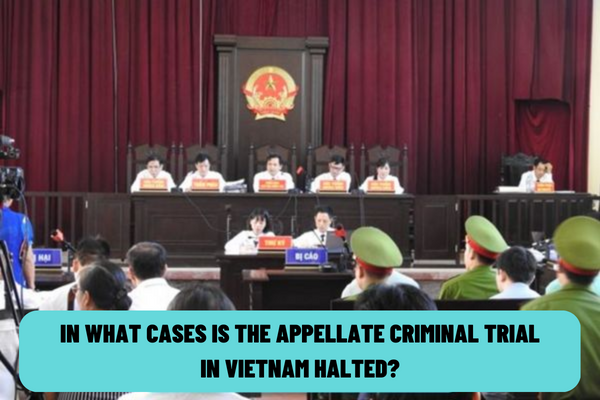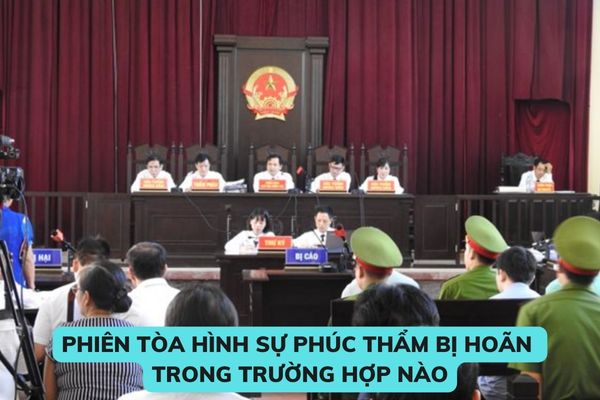In what cases is the appellate criminal trial in Vietnam halted? How long is the duration of a halt to an appellate criminal trial in Vietnam?
In what cases is the appellate criminal trial in Vietnam halted?
In Clause 1, Article 352 of the 2015 Criminal Procedure Code of Vietnam stipulating halt of appellate trial as follows:
Halt of appellate trial
1. The appellate court can halt the trial only in one of the following events:
a) There are justifications as defined in Article 52, 53, 349, 350 and 351 of this Law;
b) Evidences, documents or items must be verified or added outside the court;
If the trial is halted, the process of adjudication shall restart.
2. The duration of a halt to a trial of second instance shall be defined in Article 297 of this Law.
Thus, the appellate criminal trial will be halted in the following cases:
- Replacement of Procurators and Checkers
- Replacement of Judge and lay assessors
- Absence of members of the appellate Trial panel and Court clerk
- Absence of Procurators
- Absence of defense counsels, protectors of legitimate rights and benefits of crime victims and litigants, appellants and individuals having duties and interests related to the appeal
- Evidences, documents or items must be verified or added outside the court

In what cases is the appellate criminal trial in Vietnam halted? How long is the duration of a halt to an appellate criminal trial in Vietnam? (Image from the Internet)
How long is the duration of a halt to an appellate criminal trial in Vietnam?
In Clause 2, Article 352 of the 2015 Criminal Procedure Code of Vietnam, the duration of a halt to a trial of second instance shall be defined in Article 297 of this Law.
Pursuant to Article 297 of the 2015 Criminal Procedure Code of Vietnam on temporary halt to trial as follows:
Temporary halt to trial
1. The court shall halt the trial in one of the following events:
a) There are justifications as defined in Article 52, 53, 288, 289, 290, 291, 292, 293, 294 and 295 of this Law;
b) Evidences, documents or items must be verified or supplemented outside the court;
c) Expert examinations must be furthered or repeated;
d) Valuation processes must be furthered or repeated.
If the trial is halted, it shall restart.
2. The duration of a temporary halt to a trial at first instance shall not exceed 30 days upon the issuance of a decision to halt the trial.
3. A written decision to halt a trial shall specify these primary details:
a) The issue date of the decision;
b) The name of the Court and full name of the Judge(s), lay assessors and Court clerk;
c) The full name of Procurator(s) exercising prosecution rights and administering the trial in court;
d) The case being adjudicated;
d) The reasons of the temporary halt to the trial;
e) The time and location for the resumption of the trial
4. The presiding judge shall represent the Trial panel to sign the written decision to halt the trial. If the presiding judge is absent or replaced, the Court president shall decide to halt the trial.
A decision to halt a trial, in 02 days upon the issuance of the decision, must be announced to the participants in legal proceedings in court, be sent to the equivalent Procuracy and to individuals absent from the court.
Thus, the duration of a temporary halt to a trial at first instance shall not exceed 30 days upon the issuance of a decision to halt the trial.
Can the appellate trial panel of a criminal case aggravate punishments of the first-instance judgment?
Article 357 of the 2015 Criminal Procedure Code of Vietnam provides for the correction of first-instance judgments as follows:
Alteration of the first-instance court’s judgments
1. In the presence of new facts or grounds showing the disparity in the first-instance court’s judgments and the defendant’s personal records or nature, degree and consequences of the crimes, the Trial panel of the appellate court shall be entitled to alter the first-instance court’s judgments as follows:
a) Exempt the defendant from criminal liabilities or penalties; enforce no additional penalty or judicial remedy;
b) Implement articles and sections of the Criminal Code on lesser crimes;
c) Mitigate the defendant’s punishments;
d) Lessen the compensation level and amend the rulings on the handling of evidences;
dd) Commute a punishment to a less harsh one;
e) Sustain or alleviate a jail sentence and grant a suspended sentence.
2. At the requests by the Procuracy or crime victims, the Trial panel of the appellate court can:
a) Aggravate punishments and implement articles and sections of the Criminal Code on harsher crimes; pass additional punishments and implement judicial remedies;
b) Increase the compensation level;
c) Replace existing punishments with harsher ones;
d) Nullify suspended sentence.
The trial panel, if acquiring sufficient justifications, can mitigate punishments and implement articles and sections of the Criminal Code on lesser crimes, commute existing punishments to less harsher ones, sustain and suspend jail sentence and reduce the compensation level.
3. The trail panel of the appellate court, if possessing satisfactory grounds, can alter the first-instance court’s judgments, as per Section 1 of this Article, for the defendants filing or facing no appeal.
Thus, the Trial panel of the appellate court shall be entitled to aggravate punishments declared in the first-instance judgment if there are requests of the Procuracy or crime victims.
LawNet
